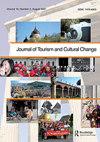Striving for a new normal after the Covid-19 pandemic: taking small businesses at Bangsaen Beach as an example
IF 2.5
4区 管理学
Q2 HOSPITALITY, LEISURE, SPORT & TOURISM
引用次数: 1
Abstract
ABSTRACT The Covid-19 pandemic interrupted Bangsaen Beach activities and disturbed livelihoods of small business operators. Before the pandemic, Bangsaen tourism experienced issues of beach quality degradation due to overcrowding, competitive vending, and lack of diversification. After the pandemic, the municipality imposed new regulations, reset zones to safeguard the public health, and jump-started the economy. The changing regulations created conflicts with vendors on zoning rearrangements and reduced sales. The author conducted a survey to investigate the beach activities, the local small business operations, and the local authority’s regulation changes. The survey results indicated that Bangsaen needs alternative attractions to complement its beach activities and to help cope with traffic congestion. The results also find out the social disparity in the demography of the vendors, which calls for attention to gender aspects and inclusive facets in the social infrastructure development strategy. This study suggests that vendors collaborate collectively with the local government to challenge the appropriation of beach spaces and to create innovative tactics. In addition, destination management organizations need to strive for better collaboration with small business operators to help them adapt to the change and enter the formal economy.新冠肺炎大流行后努力实现新常态:以Bangsaen Beach的小企业为例
摘要新冠肺炎疫情中断了Bangsaen海滩的活动,扰乱了小企业经营者的生计。在疫情之前,由于过度拥挤、竞争激烈的自动售货和缺乏多样化,Bangsaen旅游业经历了海滩质量下降的问题。疫情过后,该市实施了新的规定,重新设置了保护公众健康的区域,并启动了经济。不断变化的法规与供应商在重新安排分区和减少销售额方面产生了冲突。作者进行了一项调查,调查了海滩活动、当地小企业经营和地方当局的法规变化。调查结果表明,Bangsaen需要其他景点来补充其海滩活动,并帮助应对交通拥堵。研究结果还发现了供应商人口结构中的社会差异,这需要在社会基础设施发展战略中关注性别方面和包容性方面。这项研究表明,供应商与当地政府共同合作,挑战海滩空间的占用,并制定创新策略。此外,目的地管理组织需要努力与小企业经营者更好地合作,帮助他们适应变化并进入正规经济。
本文章由计算机程序翻译,如有差异,请以英文原文为准。
求助全文
约1分钟内获得全文
求助全文
来源期刊

Journal of Tourism and Cultural Change
HOSPITALITY, LEISURE, SPORT & TOURISM-
CiteScore
5.10
自引率
9.10%
发文量
31
期刊介绍:
Journal of Tourism and Cultural Change ( JTCC ) is a peer-reviewed, transdisciplinary and transnational journal. It focuses on critically examining the relationships, tensions, representations, conflicts and possibilities that exist between tourism/travel and culture/cultures in an increasingly complex global context. JTCC provides a forum for debate against the backdrop of local, regional, national and transnational understandings of identity and difference. Economic restructuring, recognitions of the cultural dimension of biodiversity and sustainable development, contests regarding the positive and negative impact of patterns of tourist behaviour on cultural diversity, and transcultural strivings - all provide an important focus for JTCC . Global capitalism, in its myriad forms engages with multiple ''ways of being'', generating new relationships, re-evaluating existing, and challenging ways of knowing and being. Tourists and the tourism industry continue to find inventive ways to commodify, transform, present/re-present and consume material culture. JTCC seeks to widen and deepen understandings of such changing relationships and stimulate critical debate by: -Adopting a multidisciplinary approach -Encouraging deep and critical approaches to policy and practice -Embracing an inclusive definition of culture -Focusing on the concept, processes and meanings of change -Encouraging trans-national/transcultural perspectives
 求助内容:
求助内容: 应助结果提醒方式:
应助结果提醒方式:


